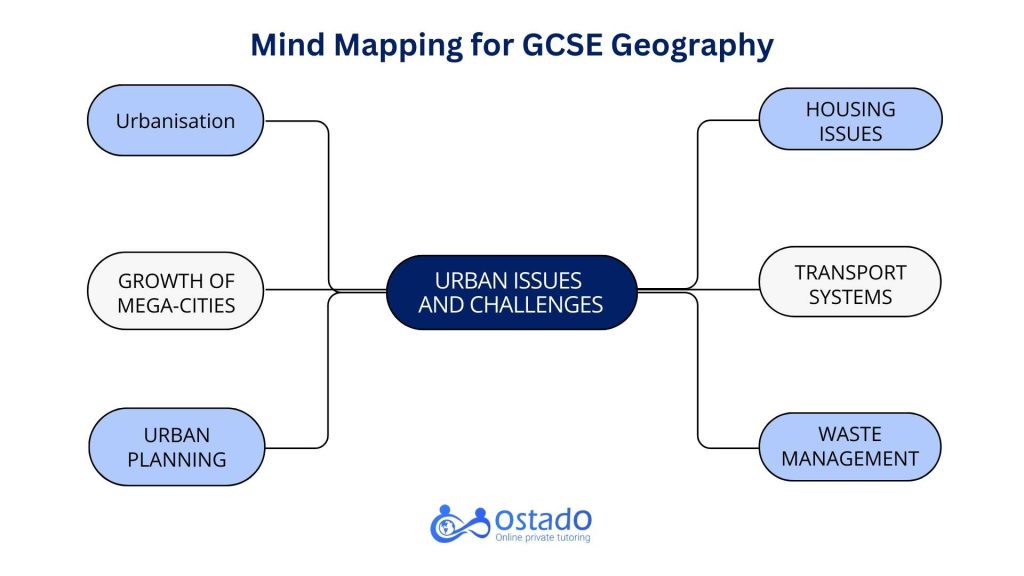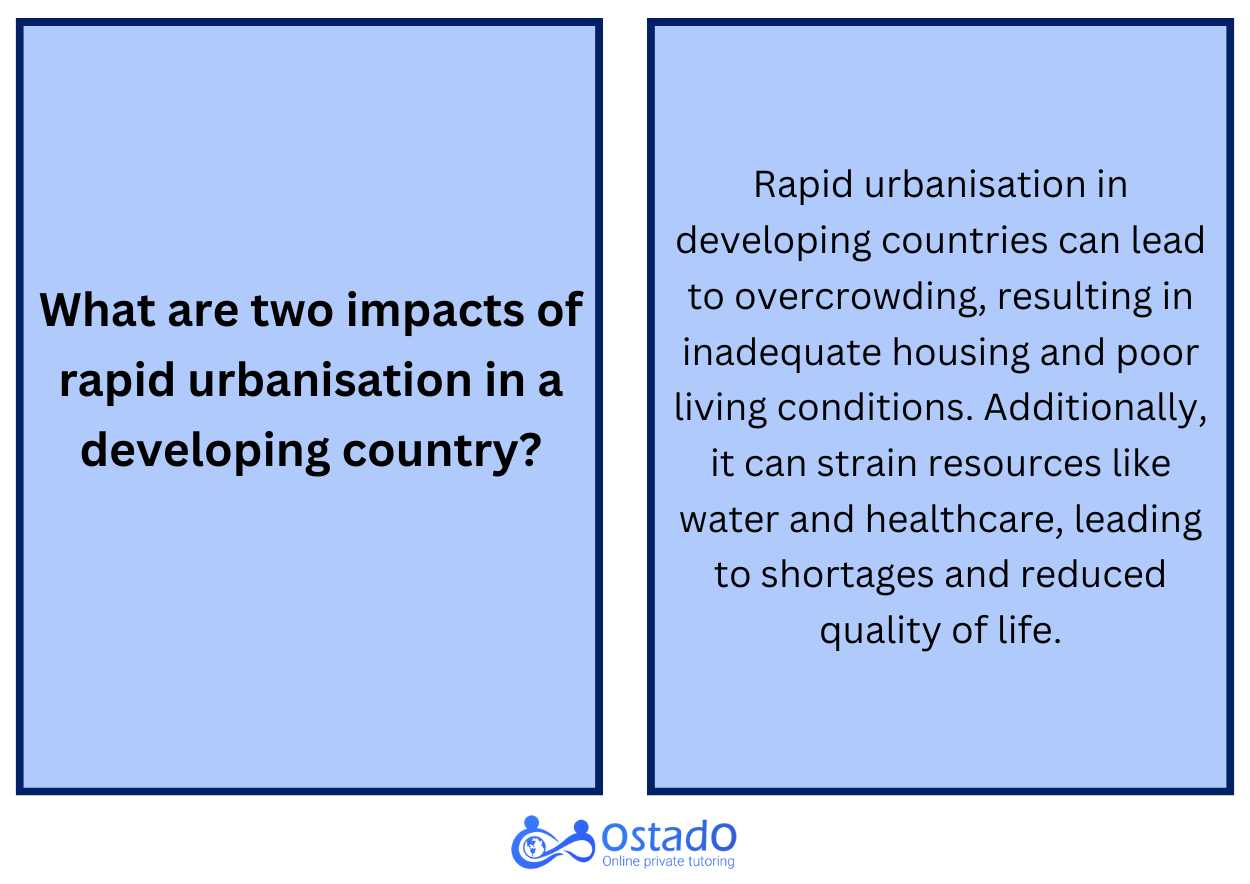Since GCSE geography paper 2 is about applying your geographical knowledge, it requires a deeper understanding of the topics. Some pupils might find paper 2 more demanding than paper 1. You can achieve the best results with the proper study and exam techniques.
Let’s work together to make your study sessions effective and manageable:
Overview of the GCSE Geography Paper 2 Syllabus
GCSE Geography Paper 2 examines the challenges and opportunities in our physical and human environment. The syllabus covers urban issues, the changing economic world, and resource management. You’ll learn how these factors affect different regions and communities worldwide.
The exam has three main sections:
- Section A is about urban issues and challenges.
- Section B focuses on the changing economic world.
- Section C covers resource management, including water, food, and energy.
The paper includes multiple-choice questions, short-answer questions, and longer writing tasks. These questions test your knowledge and ability to apply what you’ve learned to real-world situations.
Breakdown of Key Topics Covered in Paper 2
To revise for GCSE geography, you first need to list all topics. In GCSE Geography Paper 2, you’ll explore human and physical landscapes, focusing on their challenges and opportunities. Understanding these topics will help you make sense of the data and case studies you’ll encounter.
-
Urban Issues and Challenges
This topic explores the growth of cities and the problems that come with it. You’ll study urbanisation, the factors driving it, and its impacts on cities worldwide, such as challenges in the human environment.
Key areas include:
- Urban growth.
- Mega-cities’ growth.
- Urban planning.
- How cities manage housing, transport, and waste.
Example Question from AQA GCSE Geography Past Paper
- Give one way in which a major city in an LIC/NEE is regionally important. (1 mark).
How to Revise?
Use Active Learning.
Mind maps are a great way to organise information. They help you see the connections between different topics and make it easier to recall details. Below is an example:

2. The Changing Economic World
Economic changes and the development of different countries are the main topics. The main ideas include:
- Indicators of development.
- The reasons for global inequalities.
- Strategies to reduce the development gap.
- The impacts of economic growth and globalisation on different regions.
Example Question:
- Which one of the following describes the change in employment in the secondary industry from 1966 to 2016? (1 mark).
- A) It halves
- B) It more than halves
- C) It stays the same
- D) It doubles
3. The Challenge of Resource Management
Resource management consists of topics about vital resource management, including food, water and energy. The topic needs case studies about resource management in different parts of the world.
You’ll learn:
- Importance of resources
- Challenges of resource management.
- Strategies to ensure sustainable use of resources.
Example Questions:
- Suggest how poor water supply may affect social well-being (3 marks).
Recommended Resources and Tools for Revision
Many GCSE geography revision websites and books are available to help you master the topics. Here are some of the best revision books for GCSE and valuable online tools to get you started.
| Best Revision Resources for GCSE Geography | ||
| Resource | What is it? | Key Features |
| AQA GCSE Geography” by Simon Ross | Revision Book | Comprehensive coverage of syllabus. |
| GCSE Geography AQA Revision Guide” by CGP Books | Revision Guide | Summaries, key points, practice questions. |
| GCSE Geography for AQA Student Book” by Oxford University Press | Student Book | In-depth coverage with case studies. |
| BBC Bitesize | Revision Website | Revision materials, videos, quizzes. |
| Quizlet | Flashcards App | Create/use flashcards to test knowledge. |
Best Strategies for Effective Revision
When revising Geography GCSE paper 2, having the right strategies can make all the difference. Let’s explore some practical techniques to ensure you’re well-prepared for your exam.
- Start by identifying the topics you need to focus on.
- Stick to your plan, but be flexible enough to adjust if needed.
- Get expert help. Ostado GCSE tutors offer personalised lessons and schedules.
- Use Flashcards to memorise key facts, definitions, and case studies.
How to Revise Using Flashcards?
Write a question or term on one side of the card and the answer or explanation on the other. Test yourself regularly and shuffle the cards to ensure you’re not just memorising the order.

- Try group study sessions.
- Use past papers.
Pro Tip for your exam day: Read throughout the paper in 3-5 minutes and start with the questions you feel most confident about.
Past Papers and How to Approach Each Question
Here are past papers and a marking scheme PDF file of Geography paper 2. Below is a guide on how to answer each question.
How to Answer Multiple-Choice Questions?
- Read Carefully: Ensure you understand the question before looking at the options.
- Eliminate Wrong Answers: Cross out any obviously incorrect answers to narrow your choices.
- Choose the Best Answer: Select the most accurate option based on your knowledge.
How to Approach Short Answer Questions?
- Be Concise: Provide clear, direct answers that address the question.
- Include Key Points: Mention specific impacts, such as overcrowding and resource strain.
- Provide Examples: Use real-world examples, if possible, to support your points.
How to Answer Essay Questions?
Plan Your Answer: Spend a few minutes outlining your main points and examples.
- Introduction: Briefly introduce the topic and mention the city you will discuss.
- Main Body: Divide the body into paragraphs, each focusing on a different strategy or aspect of the issue. Use headings if they help organise your thoughts.
- Use Examples: Support each point with specific examples from the city you are discussing.
- Conclusion: Summarise your main points and restate the effectiveness of the strategies.
GCSE geog Paper 2 FAQ
- What topics are in GCSE geography Paper 2?Urban issues and challenges, the changing economic world, and resource management. You'll study how cities grow, the factors that drive economic development, and how we manage essential resources.
- What comes in Geography Paper 2?The human environment, urbanisation, economic development, and resource management. The questions test your understanding of urban growth, global inequalities, and sustainable resource use.
- How long is Geography Paper 2?The exam is 2 hours and 30 minutes long.

